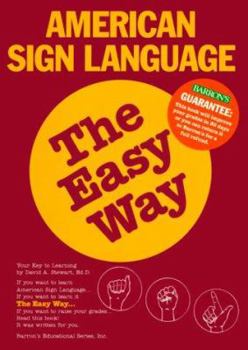American Sign Language the Easy Way
Select Format
Select Condition 
Book Overview
Current estimates have more than one million people using American Sign Language (ASL) in the United States, including approximately 450,000 deaf people. As growing numbers of deaf students are... This description may be from another edition of this product.
Format:Paperback
Language:English
ISBN:0764102990
ISBN13:9780764102998
Release Date:October 2003
Publisher:Barrons Educational Series
Length:474 Pages
Weight:2.15 lbs.
Dimensions:1.1" x 7.7" x 10.9"
Customer Reviews
4 ratings
An Excellent Book For Beginners
Published by Thriftbooks.com User , 23 years ago
I have been studying Sign Language off and on for a few years, but while reading one book, I learned that ASL and Exact Signed English are two different things. I have already learned foreign languages, so I was eager to give ASL a good try. I wanted to sound like a "native" sign language speaker, since ASL is usually restricted to the Deaf community. This book explains the grammer of ASL and vocabulary for different situations very easily and clearly. It has many exercises, so it is hard to forget something that you learned in a lesson. Right now I can talk in various situations, and I'm only on Chapter 2! This is a very good book, and at a good price, too. I highly recommend it.
A Must-Have Book
Published by Thriftbooks.com User , 24 years ago
The publisher promotes this book as a study guide to improve your grade in an ASL course. In fact, it is much more. Even if you do not have access to a formal class in ASL, this book gives an excellent introduction to deaf culture and American Sign Language. The author does a great job of explaining to beginners the grammatical rules of a language whose syntax is just beginning to be understood by linguists. The diagrams of how to form the signs are pretty good -- it's tough for any book to really show the movements unambiguously. One of the last sections includes a complete translation of The Lord's Prayer, interesting both for its religious significance as well as being the longest ASL monologue I have seen in any book. (Dialogues only can show you so much about a language).
An easy and informative guide to learning ASL.
Published by Thriftbooks.com User , 25 years ago
Finally, a book that looks at ASL completely!! 'American Sign Language the Easy Way' is a must for the beginner ASL user. It provides comprehensive information about the signs themselves, the grammar of ASL, the importance of facial expression and the culture that surrounds native users. The conversational dialogues illustrated in the book give students useful and real-life scenarios of signs exchanged when interacting with other ASL users. When learning any oral language, grammar plays an important role. This is also true for ASL, a manual mode of communication that has its own unique set of grammatical rules that must be learned to converse effectively. Other books in ASL do not stress the importance of the grammar and facial expression. The Easy Way illustrates a wide variety of signs and the context for their use. I recommend this book to everyone who is interested in learning ALL about American Sign Language, its form and culture.
This book is ideal for both teaching and self taught methods
Published by Thriftbooks.com User , 25 years ago
American Sign Language The Easy Way is an explorative introduction to deaf language and culture. This book combines basic ASL grammar and language rules with conversational signs. Whether one is in a classroom or at home, ASL The Easy Way is a reliable sourcebook. It appeals to both students and teachers. As a beginner ASL student, I have found this book to be very useful. There are many misconceptions about ASL and this book provided an excellent introductery summary to erase these thoughts. For example, David Stewart discusses the physical and cultural dimensions of ASL. Stewart strongly states that "Learning ASL is not simply about learning another language. It is about access...ASL gives us access to Deaf culture"(p.5). Both chapter three and seven are essential to the understanding of ASL. Although short, Chapter 3: The Deaf Community, describes the complexity of deaf culture. Stewart distinguishes between nondeaf and deaf communities. He describes the "five important differences as: American Sign Language; Socialization; Organizations and Clubs; Schools for the deaf; and Deaf pride."(p101-102). As a speaking person learning ASL, these are five differences I did not think of until reading this book. In Chapter seven, Stewart discusses technology and adaptations to a speaking world. He focuses on tele- communition technology, alerting devices and sign language interpreting. Living with a deaf mother, I am well aware of the TTY, close captioning and interpreters. However, I was surprised at the alerting devices, such as lights flashing or vibration. I am embarrassed to say that my mother lives in a hearing home, one that does not have alert devices. I hope to convince my family that we should add such devices to better aid my mother, especially when she is alone. The vivid illustrations of signs in combination with grammar rules allows a beginner to learn ASL in two fold. I reccommend this book for anyone interested in learning ASL and for those who need a reliable classroom source book. Dr. David Stewart has done an excellent job within the limitations of Barron's 'the easy way'.






